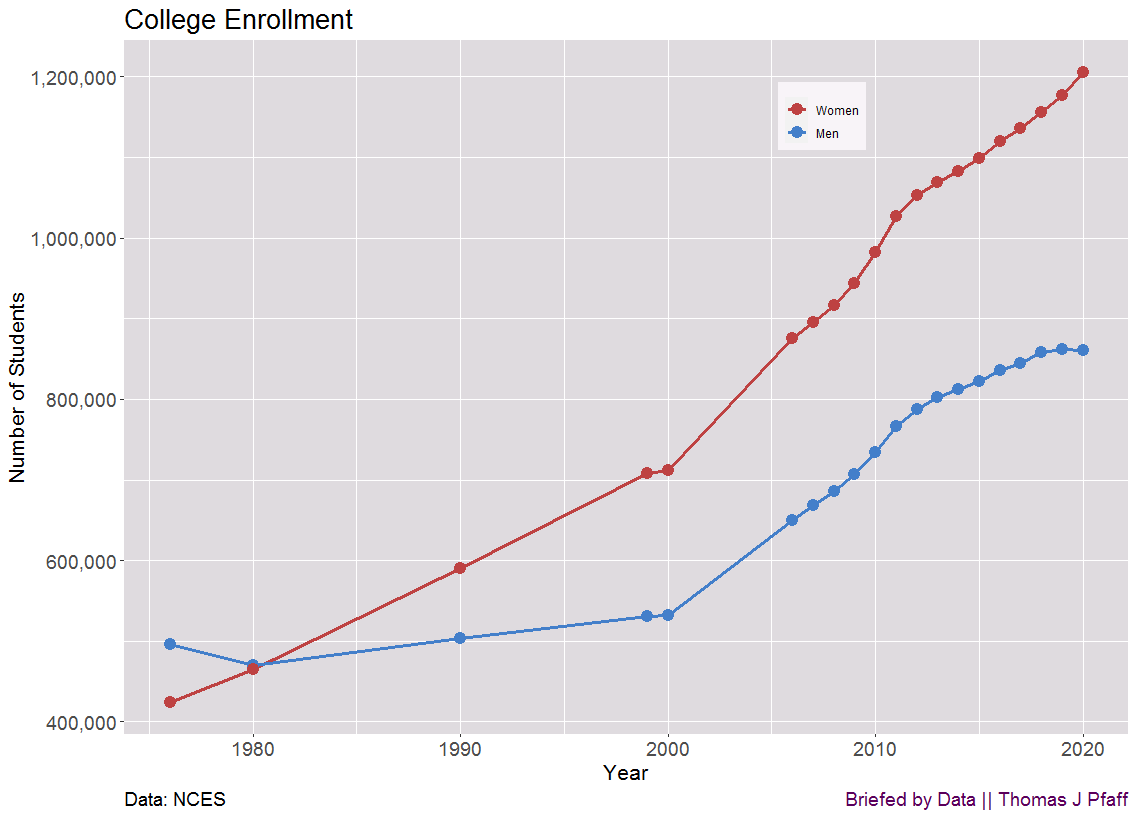Here are four graphs about female vs. male undergraduate enrollment, with a few comments.
Women overtake men in numbers in…
The statistics from the National Center for Education Statistics had some gaps, but it is obvious that women surpassed men in the early 1980s (Figure 1: Note that 1980 represents the 1980-1981 academic year). In other words, women have outnumbered men on campus for more than 40 years. Furthermore, the number of male students began to stagnate in 2018, while female students continued to climb.
It's also worth noting how much college enrolment has risen since 1980. There were fewer than one million students in 1980, but by 2010, there were that many women in college alone.
Percentage of women in college
It is useful to examine Figure 1 in percentage terms, which is Figure 2. Women made up 58.4% of students in 2020. The numbers were constant from 2000 to roughly 2015, when the percentage of men began to decline again. It should be emphasized that men outnumber women in the United States until approximately the age of 50, but the difference is near enough that we don't need to adjust Figure 2.
Top 10 areas for women
Figure 3 displays the top programs for women as well as the percentage of men and women enrolled in those programs. If we want to discuss over or underrepresentation in a program, we should probably return to the proportion in college as well as the 50/50 level. The black line in Figure 3 represents the 58.4% of women who are in college. The top two programs are nearly 90% female. What about fields dominated by men?
The top 10 areas for men
In Figure 4, the males fill the bars first, and the black line equals 100-58.4 = 41.6. Figure 4 is nearly identical to Figure 3, except that the female-dominated top 10 has a slightly larger percentage of females than the male-dominated top 10. On the other hand, as compared to the baseline of the percentage of women in college, there is more blue above the black line in Figure 4 than there is red above the black line in Figure 3. What it does imply is that guys are concentrated in a few programs.
Conclusion
It is clear that men have been a minority on campus for longer than most people likely know. Hence, it is a bit head-scratching to read quotes such as this one in the Chronicle of Higher Education article A Crusade to End ‘Reverse Discrimination’
Nicole Bedera, a sociologist and fellow at the Institute for Research on Male Supremacism, said she’s “disheartened and frustrated to see the Office for Civil Rights take these concerns as legitimate,” especially when the filers haven’t presented any evidence that anyone has been harmed by their exclusion from the programs and scholarships. “The harm they’re saying these scholarships present for men is just not real,” she said.
And yet, for the women who have benefited from them, their loss or dilution carries real consequences, Bedera said. “Women are losing some of the very paltry remedies that exist for addressing gender inequality on campus.”
I'd like to know what "gender inequality" this person believes exists on college campuses. It is true that men dominate some of the STEM fields, but no more than Health sciences, education, and psychology are dominated by women. If one wants to argue that more women in engineering would be beneficial to society because of, say, perspective diversity, then the same reasoning applies to psychology. On the other hand, perhaps males and females appreciate different educational programs in general. In the future, I'll look into graduate programs.
Please share and like
Please help me find readers by forwarding this article to your friends (and even those who aren't your friends), sharing this post on social media, and clicking like. If you're on Twitter, you can find me at BriefedByData. If you have any article ideas, feedback, or other views, please email me at briefedbydata@substack.com.
Thank you
In a crowded media market, it's hard to get people to read your work. I have a long way to go, and I want to say thank you to everyone who has helped me find and attract subscribers.
Disagreeing and using comments
I'd rather know the truth and understand the world than always be right. I'm not writing to upset or antagonize anyone on purpose, though I guess that could happen. I welcome dissent and disagreement in the comments. We all should be forced to articulate our viewpoints and change our minds when we need to, but we should also know that we can respectfully disagree and move on. So, if you think something said is wrong or misrepresented, then please share your viewpoint in the comments.








